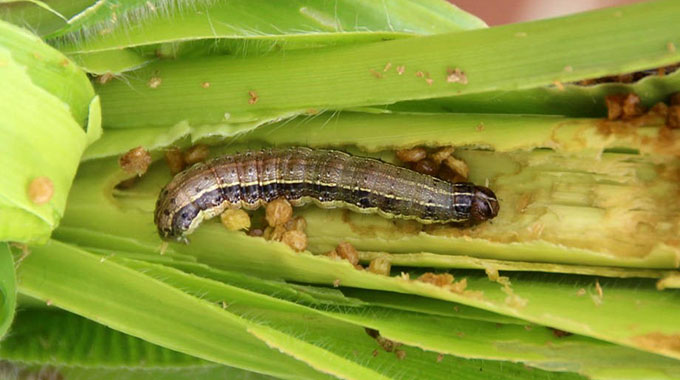Govt warns of African armyworm

Precious Manomano Herald Reporter
The Department of Migratory Pests and Biosecurity Control has warned the public to be alert on the outbreak of African armyworm which is reported to be currently in Malawi.
The department also detected moths in Mashonaland West through its Early Warning System. The Department’s Director Mr Shingirayi Nyamutukwa said farmers should be on the lookout for African armyworm caterpillars in their fields.
He said chemicals to fight the African armyworm are available and ready for distribution free of charge for the control of African armyworm.
The Department also said farmers must continue scouting for pests to reduce losses.
“Farmers should be on the lookout for African armyworm caterpillars in their fields. Scouting should therefore be done every day for early detection and control. If unnoticed, the caterpillars can cause 100% crop loss forcing farmers to replant,” he said.
Mr Nyamutukwa said farmers should report any suspected caterpillars.
Tobacco Farmers’’ Union Trust president Mr Victor Mariranyika said there is a need to create awareness campaigns so that every farmer becomes aware of the situation.
“Farmers should be educated hence awareness programmes are effective when dealing with such issues. Agritex officers should also be working with farmers in identifying areas where African armyworms prefer. We applaud the effort done by Government so far to secure enough chemicals in preparation for the disaster,” he said.
The African armyworm has been a challenge to farmers in Zimbabwe. The pest originates from Zambia, Uganda or Tanzania and is carried by strong winds from one area to another.
The armyworm is the larvae stage of a moth that is common in Southern Africa. The moth is easily identified by the colour of its wings which are dark brown with black spots, while hind wings are white with dark edges. The migratory moths travel in multitudes and cover long distances during the night. They can cross national boundaries within a short period while being driven by winds.
Experts note that the moths follow humid areas and lay eggs at a very fast rate. A female can lay up to 800 eggs within five weeks. The armyworm can wipe out the whole crop during the night if not controlled on time, as it has a monster appetite for foliage. Young armyworms are small and it is hard to see them, but the best time to check for the pest is in the morning or evening. Farmers can expect an armyworm outbreak when they see sudden swarms of moths around cooking fires and candles.
The prospect of low yields from the 2019-2020 summer cropping season due to prolonged dry spells has been increased by reports of an outbreak of the African armyworm in some parts of the country where over 570 hectares of maize and sorghum have been destroyed by armyworm in Mbire District, Mashonaland Central.
The armyworm is so destructive and it is a serious threat to food security. Problems of the armyworm have been reported for decades every cropping season.






Comments